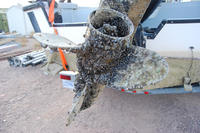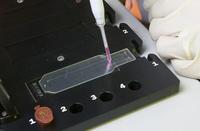-
Electron beam reduces virus-related health risk in lettuce, spinach
Current health-care costs in the United States associated with foodborne viruses are estimated at about $6 billion; scientists show that electron-beam irradiation can reduce the health risks in iceberg lettuce and spinach, but note that electron-beams are not meant to be used as a “stand-alone” or “clean-up” technology
-
-
Compressed natural gas as transportation fuel
A number of different fuel sources — ethanol, biodiesel, electricity, and hydrogen — have each shown their promise as an alternative to petroleum; scientists at Argonne Lab want to add one more contender to the list of possible energy sources for light-duty cars and trucks: compressed natural gas (CNG)
-
-
The strength of a spider web depends on design, not only on silk

New study shows that spider web’s durability depends not only on silk strength, but on how the overall web design compensates for damage and the response of individual strands to continuously varying stresses
-
-
Running robots for hard-to-reach places
A large fraction of the Earth’s surface remains inaccessible to conventional wheeled or tracked vehicles, while animals and humans traverse such terrain with ease and elegance; scientists are working to develop search-and-rescue robots which emulate animal or human walking, thus making them more capable of saving people in hard-to-reach places
-
-
Helicopters emulate humpback whales to become more maneuverable
Humpback whales are renowned for their great speed and acrobatic skills; they achieve both because of their unusually large pectoral fins, which have characteristic bumps along the front edge; researcher say that placing similar bumps on helicopter rotor blades (the technical term is “leading-edge vortex generators”) will increase the speed and maneuverability of helicopters
-
-
Invaders wreak havoc on U.S. ecosystems

In the decade since the 9/11 attacks, DHS’ focus on combatting terrorism has left some of its core agencies ill-equipped to perform its other missions, namely the Customs and Border Protection’s (CBP) ability to prevent invasive plants and insects from entering the United States and wreaking havoc on crops
-
-
Portable device quickly detects pathogens in developing countries

Two Cornell University researchers will combine their inventions to develop a handheld pathogen detector that will give health care workers in the developing world speedy results to identify in the field such pathogens as tuberculosis, chlamydia, gonorrhea, and HIV
-
-
Day of human-elements technology nears
Human-element research looks into biometrics, brain/computer interface and interaction, and human language technology; the U.S. military encourages government agencies, academic institutions, and commercial organizations to collaborate in this research
-
-
Self-guided bullet can hit target a mile away
Researchers have designed a self-guided bullet; the dart-like, self-guided bullet for small-caliber, smooth-bore firearms that hit laser-designated targets at distances of more than a mile
-
-
Pepco buys solar competition prize-winning building for display
WaterShed, a prize-winning, energy-saving house designed by a team from the University of Maryland, has been bought by Pepco; the utility will maintain the building and open ot for public display
-
-
Europe crops damaged by pollution crossing oceans, continents
Pollution originating from North America is responsible for a 1.2 million ton annual loss of wheat in Europe; this is the biggest intercontinental ozone pollution-related impact on any food crop
-
-
How wings really lift
A wing lifts when the air pressure above it is lowered. The explanation typically offered in high school and college physics courses is that this happens because the airflow moving over the top, curved surface has a longer distance to travel and needs to go faster to have the same transit time as the air travelling along the lower, flat surface. This is the wrong explanation, and a 1-minute video released by the University of Cambridge sets the record straight on this much misunderstood concept — how wings lift
-
-
Preparing for the end of the world as we know it
In a growing trend, more and more Americans across the United States are preparing themselves for a catastrophic apocalypse; for reasons ranging from terrorists to natural disasters or an economic meltdown, these individuals have begun stockpiling food, taking survival courses, or constructing safe rooms
-
-
Wetlands capture more carbon than earlier thought

New study shows that wetlands in temperate regions are more valuable as carbon sinks than current policies imply; the study found that the stagnant wetland had an average carbon storage rate per year that is almost twice as high as the carbon storage rate of the flow-through wetland
-
-
Students compete in zero-gravity robotic competition
Two hundred high school students were on the campus of Massachusetts Institute of Technology (MIT) on Monday for a competition to program miniature satellites aboard the International Space Station
-
More headlines
The long view
New Technology is Keeping the Skies Safe
DHS S&T Baggage, Cargo, and People Screening (BCP) Program develops state-of-the-art screening solutions to help secure airspace, communities, and borders
Factories First: Winning the Drone War Before It Starts
Wars are won by factories before they are won on the battlefield,Martin C. Feldmann writes, noting that the United States lacks the manufacturing depth for the coming drone age. Rectifying this situation “will take far more than procurement tweaks,” Feldmann writes. “It demands a national-level, wartime-scale industrial mobilization.”
How Artificial General Intelligence Could Affect the Rise and Fall of Nations
By Barry Pavel et al.
Visions for potential AGI futures: A new report from RAND aims to stimulate thinking among policymakers about possible impacts of the development of artificial general intelligence (AGI) on geopolitics and the world order.
Smaller Nuclear Reactors Spark Renewed Interest in a Once-Shunned Energy Source
By David Montgomery
In the past two years, half the states have taken action to promote nuclear power, from creating nuclear task forces to integrating nuclear into long-term energy plans.
Keeping the Lights on with Nuclear Waste: Radiochemistry Transforms Nuclear Waste into Strategic Materials
By John Domol
How UNLV radiochemistry is pioneering the future of energy in the Southwest by salvaging strategic materials from nuclear dumps –and making it safe.
Model Predicts Long-Term Effects of Nuclear Waste on Underground Disposal Systems
By Zach Winn
The simulations matched results from an underground lab experiment in Switzerland, suggesting modeling could be used to validate the safety of nuclear disposal sites.
